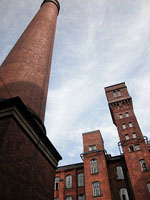
Now perhaps unsurprisingly, watching Mervyn Day immediately put me in mind of how I felt when I first saw Finisterre: it was like I was watching something I could have made myself. By which I donít mean any old sod with a video camera could have made it, but rather that this was something speaking to me with a visual voice I could recognise as being similar to my own. And thatís a feeling that is both unsettling and comforting all at once.
Paul Kelly makes films with the eye of a stills photographer. Heís infatuated with surface detail, understanding that itís through such detail that we can tell the bigger stories with so much more eloquence than with large expansive panning shots. Heís also intrigued by textual elements, and anyone whoís seen Walker Evanís classic photographs of signs will understand the value of that. His visual voice is spare but full of a warmth thatís difficult not to be engaged by. Itís hard not to be pulled into his films, not to be carried along by the narratives that weave through them. Even (especially) in a film like Finisterre where there is no traditional narrative structure to hang on to. And even though there is a narrative of sorts within Mervyn Day, it serves more as a vehicle to carry something more lasting; and that is a snapshot of an environment, of a geographical location and of a people overlooked for so long, and whose world will be irrevocably changed by the coming of the Olympics to this part of London in 2012.
In Mervyn Day Kellyís visual voice is again more than ably supported by the voice of scriptwriter Kevin Pearce, and of course by the aural voice of the St Etienne band who last night performed a live accompaniment that was as sublime as it was seamlessly integrated. Kevin of course is one of the great Pop writers of this or any time, and his clipped prose, full of natural rhythm and exquisite timing is perfectly in tune with the aesthetic that threads through the art forms of all those involved. David Essex and Linda Robson give glorious physical voice to much of Pearceís concise and quietly clever script, though the talking heads of locals with their memoirs and thoughts for the future merge seamlessly and are every bit as evocative and powerful.
Similarly, the ghostly radio transmissions reporting the London suicide bombings that punctuate the film root it very strongly to its context. Eerily, the original premise of the film was always that it was to be set on the day after the announcement of the Olympic bid result: indeed when filming started no-one even thought London would be successful, and who on earth could have envisaged the other events of that day? It would of course have been easy to make more of the horrors, and perhaps even more tempting to sidestep them altogether, but itís to everyoneís credit that all the threads, both planned and unplanned for, have been pulled together in such a sensitive and underplayed manner. Ultimately what this team have created is a beautiful capsule that pulses backwards and forwards through time. It plays the tricks of cinema by making the grim beautiful and the real unreal whilst simultaneously celebrating the most inventive of post-war British documentary traditions; presenting facts within a historical context that itself ducks and dives around a mediated fiction.
With delightful winks back to their previous film (the old bakerís bike ridden by paperboy Mervyn - perfectly played by Kellyís nephew Noah - is a nod back to the boneshakers Vic Godard talked about in Finisterre), What Have You Done Today Mervyn Day? is further evidence that marks out St Etienne and their extended creative team as one of the most quietly adventurous and observant urban romantics of this time or any. We should treasure them all enormously.
© 2005 Alistair Fitchett